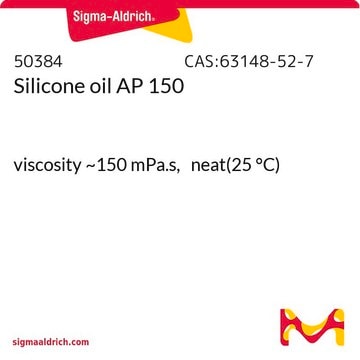85409
Silicone oil
for oil baths (from −50°C to +200°C)
Synonym(s):
Dimethyl polysiloxane
Sign Into View Organizational & Contract Pricing
All Photos(1)
About This Item
Linear Formula:
[-Si(CH3)2O-]n
CAS Number:
MDL number:
UNSPSC Code:
12352100
NACRES:
NA.21
Recommended Products
grade
for oil baths (from −50°C to +200°C)
Quality Level
vapor density
>1 (vs air)
vapor pressure
<5 mmHg ( 25 °C)
5 mmHg ( 20 °C)
form
oil
refractive index
n20/D 1.403 (lit.)
n20/D 1.406
viscosity
100 mPa.s(20 °C)
bp
>140 °C/0.002 mmHg (lit.)
density
0.967 g/mL at 20 °C
Looking for similar products? Visit Product Comparison Guide
General description
Silicone oil is typically used for oil baths in research labs for reactions that require heating/reflux temperatures in the range of -50°C to +200°C. Oil baths provide more uniform heat in comparison to other heating devices.
Silicone oil is useful for the preparation of oil baths having a temperature in the range of -50°C to +200°C.
Application
Silicone oil has been used for the protection of carbon steel alloy samples in a study. Silicone oil has also been used as a heat reservoir during NMR (Nuclear Magnetic Resonance) analysis.
Storage Class Code
10 - Combustible liquids
WGK
WGK 1
Flash Point(F)
214.0 °F - closed cup
Flash Point(C)
101.1 °C - closed cup
Personal Protective Equipment
dust mask type N95 (US), Eyeshields, Gloves
Choose from one of the most recent versions:
Already Own This Product?
Find documentation for the products that you have recently purchased in the Document Library.
Customers Also Viewed
Low-temperature atomic layer deposition of Al2O3 thin coatings for corrosion protection of steel: surface and electrochemical analysis.
Diaz B, et al.
Corrosion Science, 53(6), 2168-2175 (2011)
M Findeisen et al.
Magnetic resonance in chemistry : MRC, 45(2), 175-178 (2006-12-13)
Most established NMR thermometers rely on temperature-dependent chemical shift differences measured from samples that are either neat or concentrated solutions (e.g. ethylene glycol, methanol). These are unsuitable for modern cryoprobes on account of strong radiation damping resulting from the high
Nobuo Yoshimoto et al.
Scientific reports, 3, 1191-1191 (2013-02-05)
When establishing the most appropriate cells from the huge numbers of a cell library for practical use of cells in regenerative medicine and production of various biopharmaceuticals, cell heterogeneity often found in an isogenic cell population limits the refinement of
Dennis C van Duijvenbode et al.
Foot and ankle surgery : official journal of the European Society of Foot and Ankle Surgeons, 19(1), 27-30 (2013-01-23)
The purpose of this retrospective study is to evaluate patient-related outcome and reoperation rate of the Swanson prosthesis in patients with and without grommets. Between 1981 and 1999, 98 Swanson MTP-1 prostheses were implanted in 84 patients (14 bilateral). The
Gary R Skuse et al.
Methods in molecular biology (Clifton, N.J.), 1001, 99-114 (2013-03-16)
Our ability to manipulate stem cells in order to induce differentiation along a desired developmental pathway has improved immeasurably in recent years. That is in part because we have a better understanding of the intracellular and extracellular signals that regulate
Our team of scientists has experience in all areas of research including Life Science, Material Science, Chemical Synthesis, Chromatography, Analytical and many others.
Contact Technical Service



